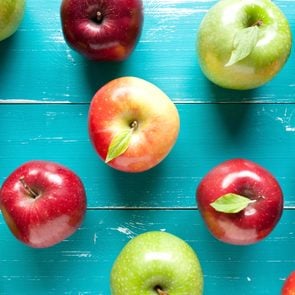7 Vegan Documentaries to Watch If You’re Thinking of Going Plant-Based
Updated: Apr. 02, 2021
Thinking about trying a plant-based diet? Stream these vegan documentaries and you may find reasons to support your new eating plan.
The rise of plant-based eating
I’ve been plant-based all of my life. Although I’m now a pescatarian, I was a full-fledged vegetarian for 18 years. And I remember the day I went vegetarian with extreme clarity. I was a counselor at a summer camp, and I’d gone with my campers to watch Chicken Run. I returned to my cabin extremely disturbed. I’d been thinking about going vegetarian for years, and that day I ripped off the Band-Aid and enrolled in the camp’s vegetarian meal plan.
Now, years later, I’m a registered dietitian nutritionist, nutrition journalist, and plant-based recipe developer. I run a plant-based eating community on Facebook, and I sell plant-based meal plans on Etsy. You could say I’m super immersed in the health benefits of going plant-based.
But I’m admittedly not well versed on vegan documentaries, and I know Chicken Run—although extremely touching—doesn’t exactly qualify as one. So I turned to fellow registered dietitians, chefs, and plant-based activists to get their opinions on what vegan documentaries you should watch if you’re thinking about going plant-based or vegan.
And by the way, following a plant-based diet isn’t just about the health benefits for your body. It’s also about the health benefits for the planet. “For me, being vegan means living with two simultaneous intentions,” says Kathy Stevens, founder of Catskill Animal Sanctuary in New York’s Hudson Valley. “One is doing the greatest possible good for the greatest possible number. And two is doing the least harm possible during my time on Earth. I’m far from perfect, but living each day with those intentions makes for a life that is both boundlessly joyous and purposeful.”
Now, may the plant-based facts be with you as you scroll down this list of films to watch.
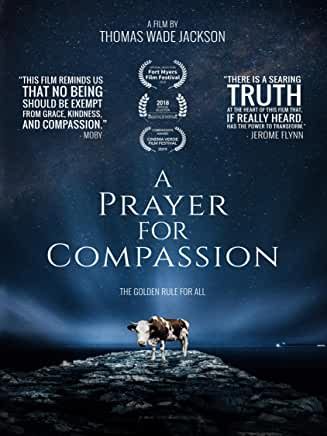
A Prayer for Compassion (2019)
While many documentaries cover aspects of health, the environment, and the cruelty of factory farming, this is perhaps the only film that centers upon the spiritual aspects of choosing not to consume animals and animal products.
The film points out that teachings of compassion lie at the heart of the world’s spiritual and religious traditions. Society is at an important point in its cultural development, where we must question food systems that have brought great harm to our health, the planet, and our kindred non-human beings.
The film points out that it’s about identity—the necessity of realizing that our true nature is to be vegan—not to cause unnecessary suffering to any of our fellow animals. Rather than trying to push an agenda, the filmmaker maintains a very open, non-judgmental view in the film during his exploration of the world’s religions.
As a vegan advocate myself, I find the documentary’s holistic view to be particularly effective: That regardless of our religious or spiritual path, all humans have the capacity to expand their circle of compassion.
The film beautifully points out that despite our cultural, ethnic, or religious differences, in essence, we are all sentient beings who desire to live in peace. –Joanne Kong, PhD, a vegan advocate and director of accompaniment and coordinator of chamber ensembles at the University of Richmond
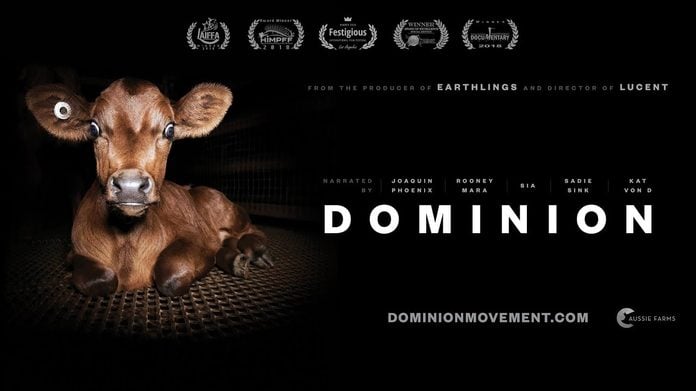
Dominion (2018)
I believe Dominion is one of the most important films ever made. It’s an unflinching, two-hour punch to the gut that exposes viewers to the barbarism of modern farming.
No one intends to do harm when they sit down to breakfast, lunch, or dinner. We’re simply trying to feed ourselves—and in many cases, mimicking the cooking styles and traditions we grew up with.
But for the billions of people who consider themselves animal lovers, Dominion shows us the brutal truth: Our choices subject innocent animals who want their lives as much as we want ours, and who are every bit as individual as our dogs and cats, to a level of horror and brutality that no good person would wish upon any living being.
The opening scene, depicting a process of killing baby pigs known as thumping, is seared into my memory several years after viewing the film. Dominion was made by vegans, but I don’t view it as pushing an agenda. Rather, it is an extraordinarily courageous film that must be seen by people of conscience who want to know how food gets to their plates.
So gather up your courage, and be prepared to be both disturbed and forever changed. –Kathy Stevens, founder of Catskill Animal Sanctuary in New York’s Hudson Valley
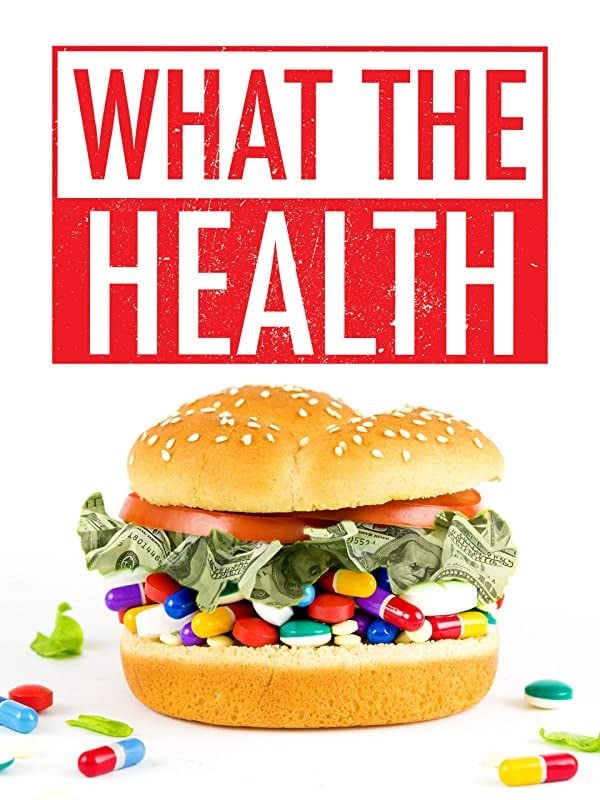
What the Health (2017)
This film focuses on the health benefits of eating a whole-food, plant-based vegan diet. I appreciate this film because the filmmakers provide scientific proof and evidence of how and why eating this way can help prevent and reverse a multitude of our world’s leading causes of sickness and death.
The film shows real-life examples of how a plant-based lifestyle can drastically improve one’s overall health and well-being. It features world-renowned doctors who have studied this extensively, and it follows people who decide to make these changes.
Researcher T. Colin Campbell, PhD, plays a large role in this movie. He co-wrote wrote The China Study, the largest epidemiological study on cancer in the world. His findings suggest that eating animal proteins promotes the growth of cancer—and eating plant proteins can be protective. –Lexi Greathouse, a climate farmer for Johnny Appleseed Organic Village, a sustainable living and farming development near Folkston, Georgia
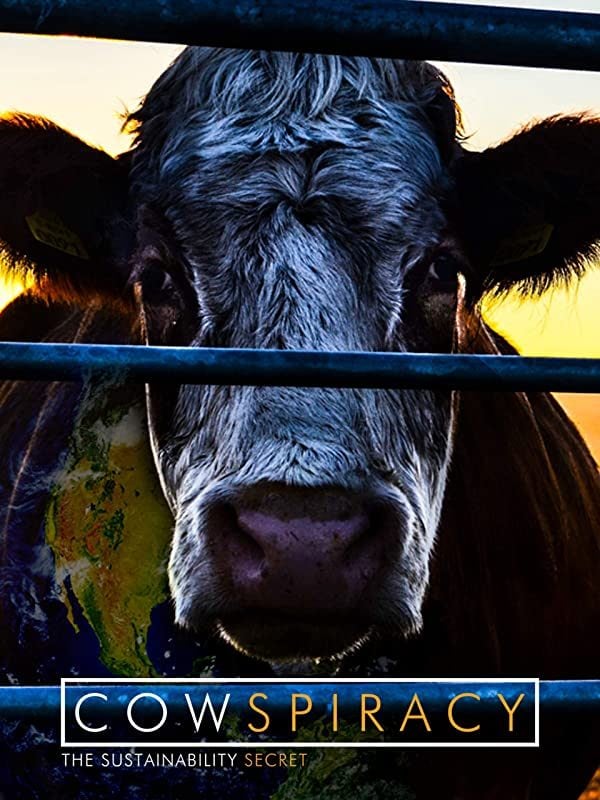
Cowspiracy (2014)
I like that Cowspiracy doesn’t spend too much time trying to guilt people into becoming vegan by overloading them with scenes that portray physical violence against animals.
Of course, there are bits [in the movie] that do reveal the unpleasant truth of what happens at concentrated animal feeding operations (CAFO) to provide steaks for millions of Americans. However, the focus is more on exposing information about the meat industry in layman’s terms.
The movie uses a lot of data and research to visually display findings on how big the environmental problem is. The key takeaway is that CAFO operations account for more than 50 percent of all carbon emissions, due to massive amounts of waste generated by the meat industry.
Most people don’t realize that carbon emissions come from the fact that cows weigh more than 1,000 pounds each and are incredibly resource-intensive. Not to mention the excrement, which due to runoffs contributes to water pollution all over the world.
So when you factor in how many cows have to be farmed in order to feed the entire global population, which is continuously growing, then it’s evident that this is an environmental catastrophe. Most people assume that the majority of pollution comes from factories and too many cars, when actually the very food that they eat every day is the prime culprit for greenhouse gases. –Casper Ohm, a marine biologist, vegan, and founder of Water Pollution, a website devoted to reducing contamination of water worldwide
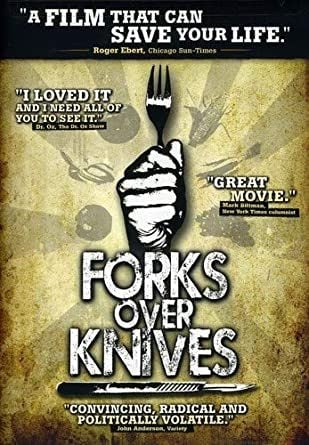
Forks Over Knives (2011)
Fork over Knives focuses on the claim that by avoiding a menu full of processed and animal-based foods, most if not all degenerative diseases can be controlled and even reversed.
The documentary also focuses on previous experiments that test this claim—and personal stories of people affected by degenerative diseases and their results after following plant-based diets. The film shares the real experiences of people, from athletes to those battling degenerative diseases, and shows what a plant-based diet can do for their health.
There is one particularly graphic scene that shows a patient in surgery with coronary artery disease as the narrator explains that the plaque that builds up in the arteries leads to heart problems, resulting in the need for heart bypass surgery.
This involves removing a vein from the patient’s leg and stitching it onto the patient’s blocked artery in the heart to allow blood flow. The clip shows the real-life procedure of someone having this surgery. It’s not an easy scene for the average viewer.
The film primarily advocates for the health benefits related to the diet, but it is important to remember that there are many schools of thought on how one can best manage health and wellness. It is always best to discuss these things with one’s own doctor or health professional. –Mark Tarbell, a chef who’s the founder of Tarbell’s Restaurant Group and an Iron Chef slayer
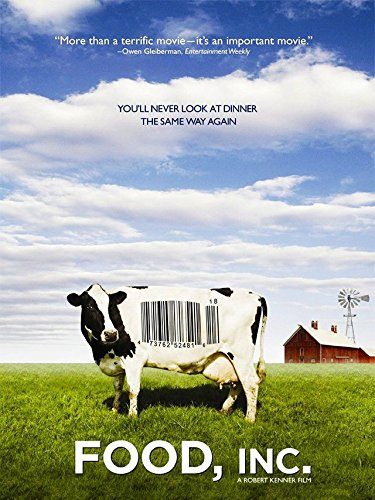
Food, Inc. (2008)
Food, Inc. was the first step in my journey of learning where my food came from and how the humans and animals who made it were treated. I think it’s helpful to watch as a gateway movie into the path to veganism.
It doesn’t preach a vegan lifestyle, but it does expose how inhumane and environmentally unsustainable big agriculture is. It’s a really well-made film. The cinematography is excellent, the interviews are informative, and the filmmakers don’t make overly grandiose claims. They stick with the facts, which makes their arguments all the more persuasive.
The movie shows how agribusiness and corporations prioritize profits over the health of their workers, the animals, and consumers. The film highlights that many elected officials are complicit in agribusiness and factory farming.
I learned that, in many states, it’s actually illegal to take pictures or videos of industrial agriculture operations. There are definitely disturbing glimpses inside the meat industry in this film. It’s not pleasant viewing, but consumers deserve to know the truth about how their food is made. –Nisha Vora, a vegan chef and author of The Vegan Instant Pot Cookbook
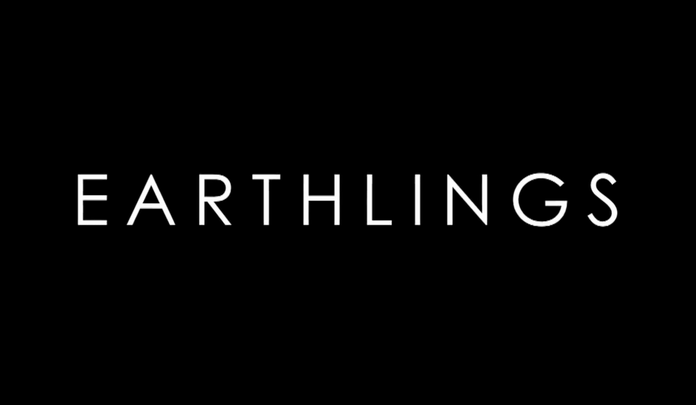
Earthlings (2005)
My favorite vegan documentary is Earthlings, narrated by Joaquin Phoenix. “It was the first [vegan documentary] I watched, and it really stuck with me. I vividly remember bawling my eyes out on the floor of my apartment as I witnessed the pain animals endure at factory farms and beyond. I gave up meat immediately.
Earthlings provides an in-depth look at how humans exploit animals. Often, we don’t know—or even think about—what happens behind the scenes at factory farms, research labs, puppy mills, and leather and fur trades. But this documentary uses hidden cameras to show the truth. While the film is incredibly upsetting to watch, it’s truly life-changing.
The documentary also lets you see animals in a whole new light. You see how smart they are, their love for each other, the pain in their eyes—how they want to live freely and happily, just like us. Most importantly, you see very clearly that they don’t want to die.
This documentary is really hard to watch. The graphic footage that shows what animals endure every day will make you sick to your stomach. But that’s the thing: Most of my life, I was blissfully unaware of the horrendous acts that were happening around me. Whenever a truck filled with pigs or cows passed me on the highway, I didn’t think about where it was heading.
Of course, it’s easier to ignore reality and eat your burger in peace. But I want to live in a way that’s not causing harm. (And my Impossible Burger is just as delicious.) –Tehrene Firman, a food and sustainability editor





















